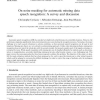Free Online Productivity Tools
i2Speak
i2Symbol
i2OCR
iTex2Img
iWeb2Print
iWeb2Shot
i2Type
iPdf2Split
iPdf2Merge
i2Bopomofo
i2Arabic
i2Style
i2Image
i2PDF
iLatex2Rtf
Sci2ools
119
click to vote
CSL
2007
Springer
2007
Springer
On noise masking for automatic missing data speech recognition: A survey and discussion
Automatic speech recognition (ASR) has reached very high levels of performance in controlled situations. However, the performance degrades significantly when environmental noise occurs during the recognition process. Nowadays, the major challenge is to reach a good robustness to adverse conditions, so that automatic speech recognizers can be used in real situations. Missing data theory is a very attractive and promising approach. Unlike other denoising methods, missing data recognition does not match the whole data with the acoustic models, but instead considers part of the signal as missing, i.e. corrupted by noise. While speech recognition with missing data can be handled efficiently by methods such as data imputation or marginalization, accurately identifying missing parts (also called masks) remains a very challenging task. This paper reviews the main approaches that have been proposed to address this problem. The objective of this study is to identify the mask estimation methods...
Related Content
| Added | 13 Dec 2010 |
| Updated | 13 Dec 2010 |
| Type | Journal |
| Year | 2007 |
| Where | CSL |
| Authors | Christophe Cerisara, Sébastien Demange, Jean Paul Haton |
Comments (0)

